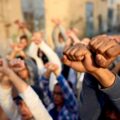Limiting free speech: The oppression of religious groups
Limiting free speech: The oppression of religious groups
In April 2022, Twitter suspended Dutch right-wing politician Geert Wilders based on an anti-Islam tweet he posted on the platform. In this tweet, which he addressed to Pakistani Prime Minister Shehbaz Sharif, Wilders spoke of “the violence of the intolerant ideology called Islam” and of the “fake prophet Mohammed.” Some people, who believe that Wilders is guilty of hate speech, showed support for Twitter’s decision. Others, however, responded to the suspension with protest. They think that Twitter is going too far because Wilders is a representative of democracy in the Netherlands.[1] In this same month, radical right-wing politician Rasmus Paludan caused several violent riots throughout Sweden after organising multiple anti-Islam rallies. In Malmö, he even staged a public burning of the sacred book of Islam. Padulan, who is the founder of Danish political party Stram Kurs, is famous for his strong anti-Islam opinions. The politician views Quran burnings as a tribute to freedom of expression.[2]
This is the value that is at stake in both examples: freedom of expression. Freedom of expression, or free speech, is a vital element of democracy. As philosopher Ronald Dworkin puts it, “[f]ree speech is a condition of legitimate government. Laws and policies are not legitimate unless they have been adopted through a democratic process, and a process is not democratic if government has prevented anyone from expressing his convictions about what those laws and policies should be.”[3]
Free speech and religious offence
Although freedom of expression is a central democratic value, many people hold the opinion that it should be limited. There are several reasons for limiting free speech: maintaining public order, protecting social cohesion, promoting civility, et cetera. Apart from this, the exercise of free speech sometimes clashes with the religious sensibilities of believers. An utterance made by someone in the name of freedom of expression can be experienced by others as an offence to their religion. The tweet that was posted by Wilders, for example, is likely to have offended the religious sensibilities of many Muslims. When perceiving an offence to the fundamental dogmas of their religion, believers tend to speak of blasphemy. But no matter how significant the offence, offence alone is usually not a sufficient reason for limiting freedom of expression. After all, freedom of expression is an extremely important value.[4]
Free speech and oppression
From the perspective of democracy, free speech typically outweighs religious offence. But there is another reason for limiting freedom of expression. This reason relates to the oppression of religious groups. Oppressed groups are subject to systemic inequalities in opportunities and power that negatively impact their lives.[5] Among other religious groups, Jews and Muslims in Europe are subject to oppression. Due to a growing trend of antisemitism and Islamophobia, they often experience racism and discrimination.[6] [7] [8] [9]
The oppression of a religious group is often sustained and exacerbated by negative ideas and stereotypes. Such negative images inspire and reinforce the discrimination and hostility that oppressed groups face. When people spread these negative images, they are likely to contribute to their oppression.[10]
In July 2022, Dutch politician Thierry Baudet was accused of spreading a notorious antisemitic conspiracy theory. The theory in question, originally formulated in the Protocols of the Elders of Zion, implies that Jewish leaders intend to pursue Jewish world domination. This theory has been used extensively throughout history to promote mistrust of the Jewish community and to justify violence against Jews. In fact, Adolf Hitler used this theory in his book Mein Kampf to inspire hatred towards Jews.[11] The spreading of these antisemitic ideas has contributed and continues to contribute to Jewish oppression.
Limiting freedom of expression
If utterances can be connected to the oppression of a religious group, we have a fairly solid reason for limiting freedom of expression. This is because these utterances are significantly harmful. They do not merely offend the religious sensibilities of believers; they actually harm the religious group by contributing to their oppression. Unlike religious offence, oppression is about more than beliefs. It is about structural conditions that impair people in their being and doing. For this reason, it provides a stronger reason for limiting free speech than religious offence.[12]
If they counter the oppression of a religious group, limits to free speech can be justified. However, it is difficult to determine what utterances have a considerable impact on the oppression of a group. In the example of Hitler, the connection is very evident. But in many cases, a connection is much harder to establish. Does the tweet posted by Wilders causally contribute to the oppression of Muslims? What about the Quran burnings initiated by Paludan? This is not exactly obvious. In any case, the oppression of a religious group is an important consideration in the debate on free speech. By contributing to the conditions of oppression, utterances can seriously harm religious groups.[13] These utterances should therefore be inhibited.
Want to learn more about similar topics? Explore the EARS Dashboard.
Sources
[1] Geert Wilders weer op het strafbankje van Twitter na islam-opmerking
[2] Bijeenkomsten van Rasmus Paludan leiden tot rellen in Zweden: wie is hij?
[4] The Cartoon Controversy: Offence, Identity, Oppression?
[5] The Cartoon Controversy: Offence, Identity, Oppression?
[6] Racism in Germany is part of everyday life
[7] 1061 gemeldete Fälle von antimuslimischen Rassismus im Jahr 2021
[8] Amsterdams onderzoek: moslims ervaren ‘normalisatie van islamofobie’
[9] Anti-Semitic incidents at decade high in 2021: report
[10] The Cartoon Controversy: Offence, Identity, Oppression?
[11] Antisemitismebestrijder: Baudet verspreidt oude antisemitische complottheorie
[12] The Cartoon Controversy: Offence, Identity, Oppression?
[13] The Cartoon Controversy: Offence, Identity, Oppression?






